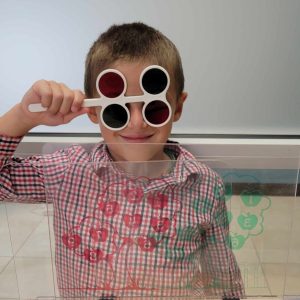Request an Assessment
Previous slide
Next slide
Just choose the appointment type and time that work best for you, and you're on your way to clear, comfortable vision!
Vision therapy exercises improve basic visual skills that connect the eyes with the brain. These exercises can improve visual efficiency by changing how a patient interprets images. A healthy connection between the eyes and the brain is essential for good eyesight.
Just choose the appointment type and time that work best for you, and you're on your way to clear, comfortable vision!

Vision exercises are designed to help patients improve basic visual skills that connect the eyes with the brain. These exercises can improve visual efficiency by changing how a patient interprets images. This helps them see and understand images correctly and effortlessly.
It uses progressive vision exercises performed under the supervision of your eye care provider. Each set of exercises is tailored to meet the individual visual needs of a patient. These exercises are done 1-2 times per week in sessions lasting 40 minutes. The exercises are designed to continue until visual processing problems show improvement.
Scientific research shows that vision therapy does work. Studies on vision therapy show it is effective in improving the lives of patients. Data shows that this therapy can improve visual function enough to keep it from interfering with a patient’s ability to absorb information and learn. In its own sphere, this therapy is as effective as physical therapy or occupational therapy. Don’t take our word for it – the College Of Optometrists in Vision Development has compiled a list of peer-reviewed journal articles supporting vision therapy.
Nothing about vision therapy is centered on strengthening eye muscles. These muscles can be strengthened through orthoptics if they need strengthening. This therapy is all about improving vision problems that may interfere with learning by strengthening the neurological pathways between the eyes and the brain.
It can be a useful tool for helping children and adults alike. Children with learning or reading problems can benefit from the vision boost these exercises provide. Eyeglasses are not the solution when the problem is visual processing. These problems can’t be detected without tests done by an eye doctor. Adults can see vision improvement through this therapy as well. It can help curb eye-strain related vision processing problems brought on by working with computers and performing paperwork all day.
A comprehensive vision exam is necessary before starting therapy. Following the exam, your eye care provider can determine whether or not this type of therapy is the recommended treatment for your vision problems.
| Monday | 9:00 am - 5:30 pm |
| Tuesday | 9:00 am - 5:30 pm |
| Wednesday | 9:00 am - 5:30 pm |
| Thursday | 9:00 am - 5:30 pm |
| Friday | 9:00 am - 5:30 pm |
|
Closed for lunch from 12:30 pm - 1:30 pm | |
| Saturday | Closed |
| Sunday | Closed |
